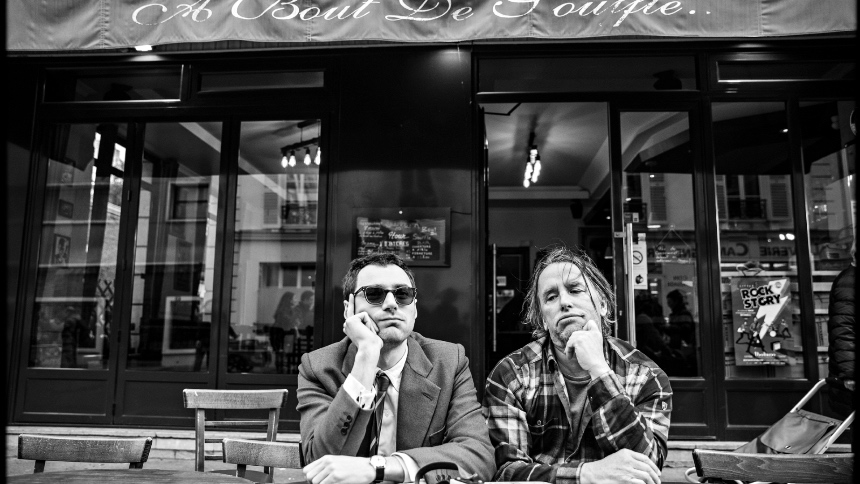Cannes 2025 Review: NOUVELLE VAGUE Knows It Shouldn't Exist
Richard Linklater and co. go walking, talking, and exploring with the Cahiers crew.

Richard Linklater has long been interested in approximating and revisiting reality. The Before films showed us temporal fragments spun out from a personal chance encounter; Boyhood crafted empathy out of temporality; and Waking Life and A Scanner Darkly abstracted our world to explore the effects that dreams and drugs can have on it.
Nouvelle Vague does not, conceptually, immediately strike as an extension of this filmography-wide project, and yet it is. The casting is eerily spot-on, to the point that it's easy to forget that this man isn't the young Godard himself (the sunglasses help). Shot in gorgeous black-and-white and delivered in a meandering new wave fashion, Linklater's film is at once a loving homage, an exploration of an era, and a freewheeling film that uses its premise as a creative catalyst for extrapolation.
Just how much has been extrapolated is the lingering question from Nouvelle Vague -- one wonders how much of this film is based on testimony and interview, and how much is creative conjecture. It's rare to leave a film clamouring to find a journalist who secured an interview with Linklater here on the Croisette.
Speaking of the Croisette, it's pretty central to Nouvelle Vague, why it works, and why those of us at Cannes who loved it found such affection for it. Linklater's film opens at the festival itself, in 1959, as Truffaut's The 400 Blows premieres. Nouvelle Vague knowingly mirrors and nods to its audience tonight (and also to the Cannes programming team who selected it). When the film begins its play internationally in the regular theatres of the world, will these nudges and winks of opening scenes feel as charming, or will they read as smug and insufferable?
The film finds a more generally digestible mode once the pre-production of Breathless commences. We follow Godard around a sequence of Paris pitstops, where key Cahiers extended universe characters are introduced with Wes Anderson-esque title cards.
At Cannes the audience cheered and laughed as we cut to these names and faces; this is the Marvel Cinematic Universe of the arthouse. Godard (for starters) has most definitely been flanderized here, more resembling Jason Schwartzman's Max Fischer from Rushmore than the actual man. But that's part of the fun.
Your mileage on whether that proposition constitutes 'fun' may of course vary. It evidences Linklater and co-writers Holly Gent, Vincent, Palmo Jr., Michèle Pétin, Laetitia Masson as self-aware that is no correct way to make this film, which audiences by-and-large agreed was a bizarre and unneeded idea when first announced (we'd suffered through The Artist filmmaker Michel Hazanavicius' bitter Godard Mon Amour, so it was fair to be sceptical).
By caricaturing Godard, the auteur and the rest of the ensemble become looser, mouthpieces for exploring the new wave ethos, history, and infamous personality clashes in a theatrically-enjoyable manner reminiscent of Linklater's previous ensemble scripts. It's sharp, continually chaotic screwball stuff, a love letter to the joys and madness of creative collaboration, the riffs on Godard's film and its surroundings akin to a 'boundary break' on Breathless.
Godard would roll in his grave at the notion that the biopic of his first feature's construction would thrive on being cinephilic fan-service fluff, but if its accessibility inspires a new generation of cinephiles, does that not extend the Cahiers du Cinema project?
The film enjoys its world premiere are the 2025 Cannes Film Festival.







